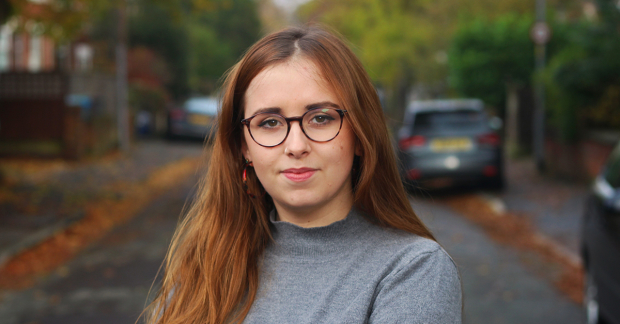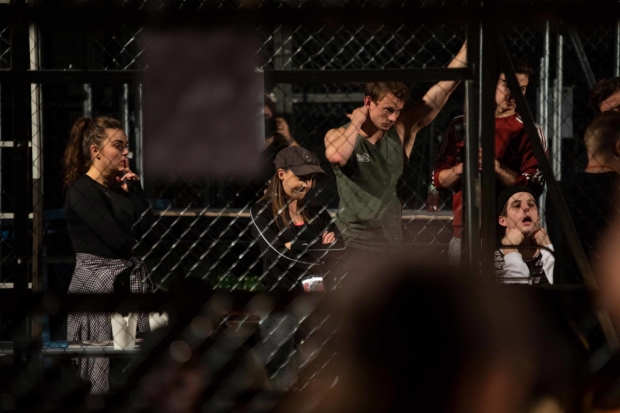Emily Oulton: So you want to be a theatre director?
As part of their guest editor week at WhatsOnStage, Chris Stafford and Nikolai Foster ask Emily Oulton, who is training at Curve Theatre as part of the Birkbeck Theatre Directing MFA, about her career experience thusfar

© Curve Leicester
As part of their guest editor week at WhatsOnStage, Curve Leicester's Chris Stafford and Nikolai Foster have invited a number of creatives who have worked with the venue to give career tips to aspiring theatremakers. This time, West Side Story's assistant director answers ten questions about her work thusfar.
1) Can you introduce yourself?
Hello! I'm Emily Oulton and I'm a theatre director. I'm training at Curve Theatre as part of the Birkbeck Theatre Directing MFA, working as assistant director on West Side Story and have just finished taking My Beautiful Laundrette on tour. Outside of this I'm developing a new musical Érainne with my company, Junction Theatre Company Ltd.
2) When did you know that you wanted to be a director?
I always knew I wanted to work in theatre but when I was in my second year of uni I directed Guys and Dolls and completely caught the directing bug. It was an epic project and a baptism of fire – a cast of 25, a band of 15, a creative team of eight and a tiny budget. It's amazing what you can create with great people, two seminar rooms and Primark!
3) What was the first project you worked on?
My first assistant directing job for a major theatre was Mixtape, (a Royal Exchange Theatre Young Company show), directed by the brilliant Matt Hassall. It was a quirky and ambitious devised gig-musical about the young people of Manchester and their interweaving lives.
4) Who helped you during the early part of your career?
We have an excellent, supportive mentor and teacher in Rob Swain, who runs the MFA in Theatre Directing at Birkbeck. He's a legend in the industry and amongst Birkbeckers – current and graduated – with brilliant advice and the best catchphrases.
5) What advice would you give to your younger self?
Don't lock down what you want to do too early. As directors we need to know how all the different departments work together to make a show, so try everything while you can; acting, stage management, producing, design – having a sound understanding of everyone's roles will improve your ability to communicate your ideas. One of my goals this year at Curve is to learn how to programme a lighting desk.

© Ellie Kurttz
6) What advice would you give to anyone wanting to be a director?
Make the most of the cheap ticket schemes, to see as many shows as you possibly can and look at who's made them. If there are directors you admire, why not write to them and ask to observe a rehearsal? The worst that can happen is that they will say no!
7) What resources proved most valuable to you during your early career?
The Birkbeck MFA has been a really focused and varied training programme, and it's not the only one of its kind! Other great schemes and courses that friends of mine have taken part in include the Regional Theatre Young Directors' Scheme, the JMK Trust, the Young Vic Directors Programme/Genesis Network and the LAMDA directing MA. I also use Twitter for seeking out opportunities and connecting with other creatives. While I was training, directing for scratch nights (at Southwark Playhouse and the Old Red Lion) really helped me to keep making work when I had less time.
8) What mistakes do you think are the easiest to make starting out?
I think it's easy to find yourself trying to make work or pursuing projects that you think you should be interested in rather than ones that you actually love. I remember doing my undergraduate dissertation on something I thought might make me sound interesting as a Serious Director rather than choosing a topic that really excited me, which at the time was 1600s French farce. Our authenticity and our individual interests are what make us artists!
9) What would you say is the most rewarding aspect of your job?
I love when I get a chance to show my work to people who wouldn't usually go to the theatre. It's the best feeling when a new audience member really connects with what they see and offers such a raw and real response. Especially if it makes them come back! I'm also a sucker for a sitzprobe (the rehearsal where the band and cast sing and play through the entire show together for the first time).
10)What would you like to see in future generations?
Theatre needs to be more accessible not just for its creators but for its audiences. I think a way that we can do this is to always bring it back to telling really good stories rather than aiming for high artistic value or an interesting concept. If it's a good story, those things will come. In the words of Sondheim: ‘content dictates form'.

















